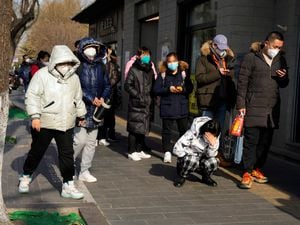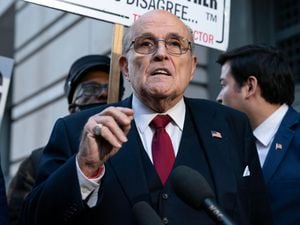China struggles with Covid infections after controls eased
The ruling Communist Party had loosened anti-virus rules as it tries to reverse an economic downturn and stop protests against zero-Covid measures.

A surge of Covid-19 cases in schools and businesses has been reported by social media users across China after the ruling Communist Party loosened anti-virus rules in a bid to reverse a deepening economic slump.
Official data showed a fall in new cases, but those no longer cover big parts of the population after the government ended mandatory testing for many people on Wednesday.
That was part of dramatic changes aimed at gradually emerging from “zero-Covid” restrictions that have confined millions of people to their homes and sparked protests and demands for President Xi Jinping to resign.

Social media users in Beijing and other cities said co-workers or classmates were ill and some businesses closed due to lack of staff. It was not clear from those accounts, many of which could not be independently confirmed, how far above the official figure the total case numbers might be.
A poster named as Tunnel Mouth wrote on the popular Sina Weibo platform: “I’m really speechless. Half of the company’s people are out sick, but they still won’t let us all stay home.”
The reports echo the experience of the United States, Europe and other economies that have struggled with outbreaks while trying to restore business activity.

But they are a jarring change for China, where the policy of “zero-Covid”, which aims to isolate every case, disrupted daily life and depressed economic activity but kept infection rates low.
Mr Xi’s government began to loosen controls on November 11 after promising to reduce their cost and disruption.
Imports tumbled 10.9% from a year ago in November in a sign of weak demand. Car sales fell 26.5% in October.
“Relaxing Covid controls will lead to greater outbreaks,” said Neil Thomas and Laura Gloudeman of Eurasia Group in a report, “but Beijing is unlikely to return to the extended blanket lockdowns that crashed the economy earlier this year.”

The changes suggest the ruling party is easing off its goal of preventing virus transmission, the basis of “zero-Covid”, but officials say that strategy is still in effect.
Restrictions probably must stay in place at least through mid-2023, public health experts and economists say. They claim millions of elderly people need to be vaccinated, which will take months, and hospitals strengthened to cope with a surge in cases. Officials announced a vaccination campaign last week.
On Friday, the government reported 16,797 new cases, including 13,160 without symptoms. That was down about one-fifth from the previous day and less than half of last week’s daily peak above 40,000.
More changes announced on Wednesday allow people with mild Covid-19 cases to isolate at home instead of going to a quarantine centre that some complained were crowded and unsanitary. That addressed a major irritant for the public.
A requirement for subway riders, supermarket shoppers and others to show negative virus tests was also dropped, though they still are needed for schools and hospitals.





